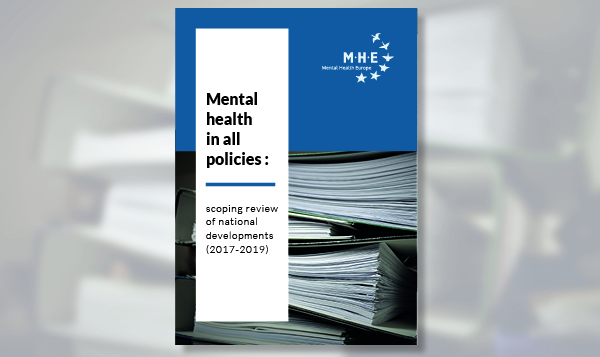New data shows the need for mental health synergies across Europe

Brussels, 27 February 2020 – Building on the past work of the European Union (EU), Mental Health Europe (MHE) has conducted a scoping review of the national developments in mental health policies from 2017 to 2019. The new report reveals that despite visible progress in many Member States, Europe needs better alignment of action in the area of mental health. This includes a stronger role of the EU in supporting the coordination of national efforts. Findings also show that there is a need for a comprehensive and proactive EU Mental Health Strategy to ensure social cohesion, sustainability, and economic growth of communities and states.
The “Mental Health in All Policies” scoping report aims to inform EU policy stakeholders about the state of play in the area of mental health across the EU. In the light of a recent European Economic and Social Committee’s conference to shape the new EU agenda for disability rights 2020-2030, the report findings could be used as supporting evidence for the future strategy from a psychosocial disability perspective.
‘Mental health is a cross-sectoral subject that can have positive impacts on society’s cohesion, wealth and productivity. Mental health-friendly policies across all sectors, therefore, play a key role in the wellbeing of Europeans and must be a crucial part of the new EU landscape,’ says Claudia Marinetti, Director of Mental Health Europe.
‘Considering the cross-cutting impact of various policies on mental health and wellbeing, stronger coordination can enhance efforts at European and national level,’ adds Marcin Rodzinka, Advocacy and Policy Officer at MHE. ‘We thus call on the Member States to align mental health specific policies and strategies with existing human rights commitments as specified in the UN Convention on the Rights of Persons with Disabilities and ensure meaningful involvement of persons with lived experience of mental ill-health and people with psychosocial disabilities.’
Furthermore, the report suggests the presence of a patchwork ad-hoc actions to address mental health problems, promote positive mental health and implement a “mental health in all policies” approach. Yet, mental health is becoming an increasingly important aspect and challenge for many individuals in Europe. Isolated actions stemming from the changeable willingness of some national or local authorities cannot be considered as a sustainable and satisfactory solution. It is therefore clear that there is a need for a European Mental Health Strategy led and coordinated by the European Union to ensure social cohesion and sustainable development.
In compliance with the recommendation by the Council of the EU, MHE calls on the European Commission to start work towards the adoption of a European Mental Health Strategy.
Stay connected
Get our latest news, personal stories, research articles, and job opportunities.